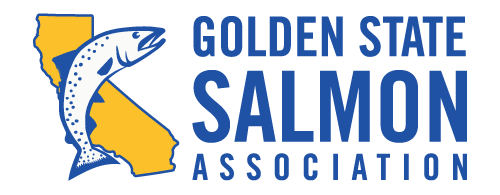For Immediate Release: April 25, 2024
For more information contact:
Regina Chichizola, Save California Salmon: Regina@californiasalmon.org, 541-951-0126 Scott Artis, Golden State Salmon Association: scott@goldenstatesalmon.org, 925-550-9208
Ruthie Maloney, North Coast Native Protectors: northcoastnativeprotectors@gmail.com, 707-502-9155
Fishermen and Tribal Members Ask California Water Board to Support Science-Based Water Plan, Deny Voluntary Agreements
Coalition Rally at California State Water Resources Control Board Voluntary Agreement Hearing
RALLY at California EPA Building, 1001 I street, Sacramento, April 26th, 12:30 pm
Sacramento, California – A coalition of Tribal members, fishermen, and others from all over Northern California will rally and testify before the State Water Resources Control Board to urge them to deny a proposal to replace flow requirements in the Bay-Delta Water Quality Control Plan (Bay-Delta Plan) with agriculture-led voluntary flow agreements. Communities from the Klamath River to the South Delta have participated in the science-based Bay-Delta Plan process for almost 15 years and repeatedly seen voluntary agreements and local cooperative solutions in Delta tributary watersheds fail, leading to water quality and salmon crises. On the last day of the State Board Hearing on the Bay-Delta Voluntary Agreements, they will once again urge the Board to heed their warnings.
“For a decade, California water agencies have promised a voluntary agreement to address the deteriorating health in Central Valley rivers and the San Francisco Bay-Delta estuary. Unfortunately, the process seems less focused on creating a credible agreement than on preventing the State Water Board from actually implementing a plan that recognizes the need for increased cold-water flows,” said Scott Artis, executive director of Golden State Salmon Association. “Yet, during all this inaction, there’s been massive water diversions from our rivers, plummeting salmon populations, closed fishing seasons, and lost jobs. People and our rivers are suffering. It’s unacceptable.”
“Phase 1 of the Bay-Delta Plan, which was based on science and input from impacted communities, was passed 5 years ago. Now due to politics the biggest water users in California are pushing their own weaker plan without including the input of impacted communities, interests, and Tribal governments,” explained Regina Chichizola from Save California Salmon, a Tribally-led environmental group located on the Klamath and Sacramento Rivers. “During this time, salmon numbers have plummeted to the point that most of the salmon runs in the Delta are facing extinction due to the diversions by these same water users. The Trinity River, the Klamath’s largest tributary, is also suffering due to over-diversion for Central Valley agricultural interests. The VA put the fox in charge of the hen house at a time when the Delta watersheds are in crisis.”
“Instead of focusing on the outdated and harmful policies of hoarding water, we should focus on water conservation, recycling, and efficiency,” stated Gia Moreno of Save Hood, a Central Valley non-profit dedicated to protecting the town of Hood. “We can’t continue to rely on archaic methods of water conveyance. We can’t continue to sacrifice the Delta, the northern river communities, and wildlife because state officials refuse to move us forward. We can’t claim to be at the forefront of addressing climate change and protecting the environment while actively working to build infrastructure that will destroy California for future generations.”
Atta Stevenson of the California Indian Water Commission said, “The Voluntary Agreements are exclusive of people of color and especially Natives, who rely on water not only for their subsistence but their way of life. I would instead like for a group that includes people of color and Tribal people to decide the Delta Plan together rather than a select special interest group like the VA folks doing it without us. The State of California needs to respect our food subsistence, tribal beneficial uses, and honor us as the original stewards of the state of California.”
Today, during testimony, Stevenson told the Water Board that Native people will continue to comment, protest, and show up until they are included in water quality and fisheries decisions, and their water is protected.
The Bay-Delta watershed covers more than 75,000 square miles, many rivers, and is the largest estuary on the Pacific coast of the Americas. Native species in the Bay-Delta are experiencing an ecological crisis due to habitat conversion, degraded water quality, harmful algal blooms, reductions in flows, and the inability to access natural habitats that are blocked by dams and levees. This has led to a severe decline and extinction of native fish and other aquatic species. The salmon levels have become so low that salmon fishing has been canceled in California for the second year in a row and only the fourth time in state history.
###
Save California Salmon is dedicated to policy change and community advocacy for Northern California’s salmon and fish dependent people. We support the fisheries and water protection work of the local communities, and advocate effective policy change for clean water, restored fisheries and vibrant communities. We aim to help to support Tribes and the general public in engaging with public comments related to water pollution, fisheries, and beneficial use issues.
The California Indian Water Commission provides Tribes, (federally and non-federally recognized), Tribal People, and communities residing in California to have a voice in water planning, protection of our sacred water, and educating the public about Tribal water rights, and traditional cultural ecological stewardship.
Golden State Salmon Association is a coalition of salmon advocates that includes commercial and recreational salmon fishermen and women, businesses, restaurants, native tribes, environmentalists, elected officials, families and communities that rely on salmon. GSSA’s mission is to restore California salmon for their economic, recreational, commercial, environmental, cultural and health values.
